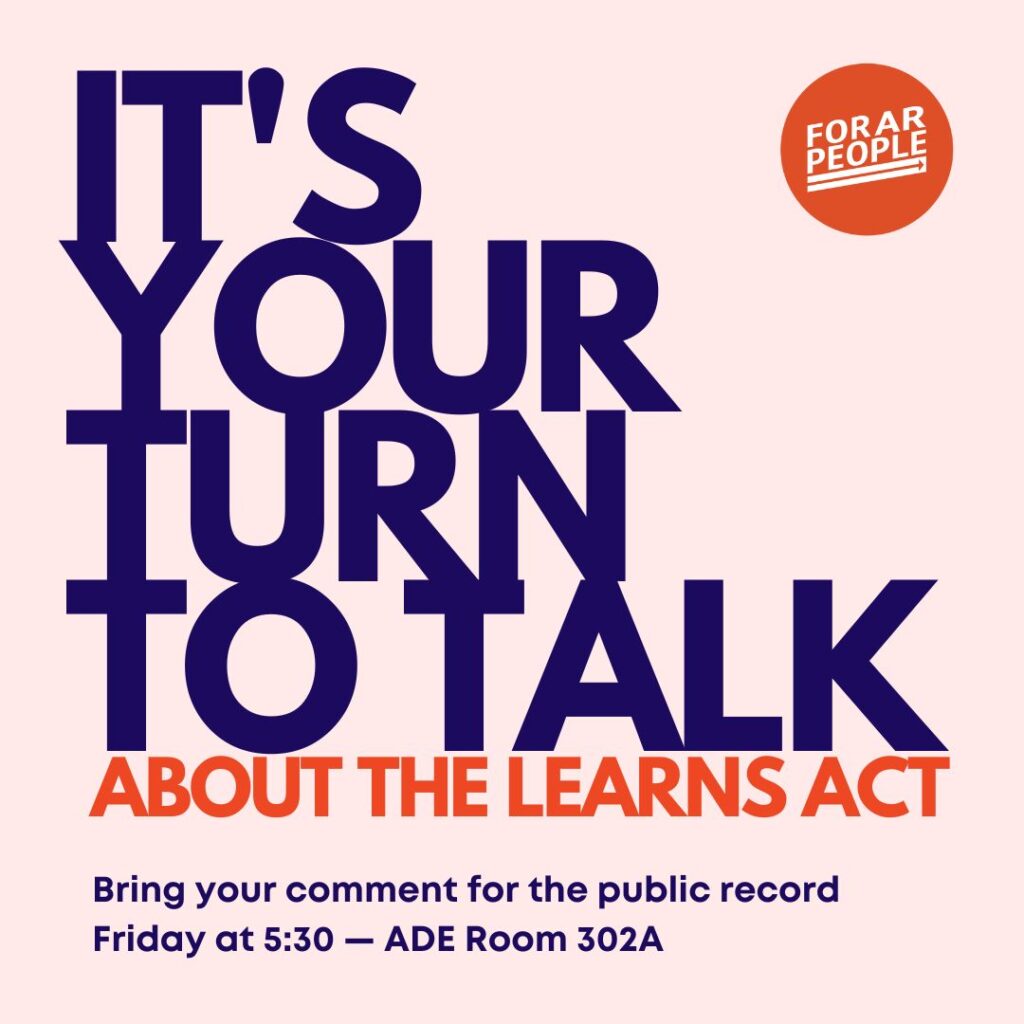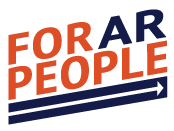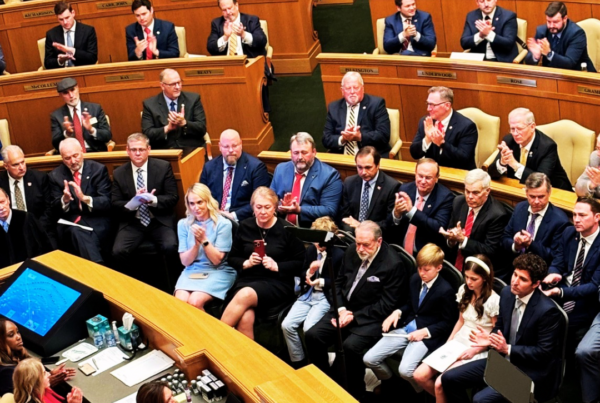Governor Sarah Sanders and Secretary Jacob Oliva have spent months traveling Arkansas on the people’s dime to promote the LEARNS Act.
It’s time for the people to respond.

On Friday, August 25 at 5:30 pm in the Department of Education room 302A the department will hear public comment on LEARNS Act administrative rules. These are the rules that contain the details for how the law will be implemented and enforced. The law requires that the department hear Arkansans’ comments on these rules before they’re adopted.
You can see the full draft of the rules here, but we’ll give you a breakdown here so you can easily show up and speak. Sections are broken down in the order they appear in the rules.
Eligibility
After the purpose and definitions sections, the rules discuss how students are eligible to receive the Education Freedom Account funding. Eligible students include:
- Students with disabilities
- Students experiencing homelessness
- Students in foster care
- Students who have previously received the Succeed Scholarship
- Students who have parents who are active-duty military personnel
- Students enrolling in kindergarten for the first time
- Students who were previously enrolled in an “F” rated schools or a district in need of “intensive support”
Applications
Parents must apply before August 1, 2023 via form on the Department of Education’s website, and may have to submit other documentation. If funds remain, some program funds can be disbursed after that deadline. Eligible applicants will be notified as to how to activate their EFA account. Eligible students will continue to be approved as funding is available.
Agreement
Here’s where things get interesting. Once approved, the EFA is established and the parent must sign a contract that includes obligations about acceptable use of the funds and reporting of expenses.
The contractual EFA agreement parents must sign includes:
- A list of qualifying expenditures
- A waiver of the rights of students with disabilities
- A list of responsibilities of account holders
- An agreement to not enroll the student full-time in a public school while part of the EFA program (Would love to know if students in part-time public school can receive EFA funds)
Funding
Each student in the EFA program will receive $6,672 quarterly in four equal payments for the 2023-2024 school year. Students who were previously receiving the Succeed Scholarship will receive the same amount they received in the previous year. The department can keep 5% for “program administration.”
Ending eligibility
Students are no longer eligible for EFA program if they are:
- Enrolled full-time in public school (again, what about part-time?)
- Graduated from high school (How is this tracked for homeschooled students?)
- 21 years of age — students may complete the school year when they turn 21
The department can remove students from the program if they break any rules from the agreement signed. The language says those who have “substantially misspent EFA funds” will be dismissed from the program. An appeal process exists for those who are removed.
Schools and providers
Private schools are certified through the department after declaring their intent to participate. These schools must meet accreditation requirements OR have applied for accreditation. While not fully accredited, such schools must report accreditation progress to the State Board “or its designee.” (We’re curious who the Board might designate to track progress.)
Schools must also have been operating for at least one year, provide proof of insurance and fiscal ability to operate, or file a bond or letter of credit with the department for needed funding. Schools must attest that they will not discriminate, will not hire anyone who is likely to misuse funds, will ensure personnel will have background checks, and will ensure disciplinary procedures are in place. These are all reasons for which eligibility can be revoked from a participating school. Schools must tell the department when they lose accreditation, and they may reapply. Department will issue notices to schools about questions of changes in eligibility. Schools may not give EFA money directly to parents.
Compliance
The department will contract with an “unaffiliated auditor” to randomly audit EFAs to ensure all expenditures were approved.
The department must create an online fraud reporting system where people can anonymously allege a violation of EFA rules by an account holder. Investigations may be referred to the Attorney General or the Department of the Inspector General.
Appeal
An appeal form is on the department website. Appeals follow a two-step process that includes deadlines of a few weeks between each level of determination. The State Board approves or denies appeals through a hearing process and has 14 days to announce a decision.
Program Evaluations
Schools must administer an exam that is required in public schools OR a comparable general education exam. The department can also approve an exam that a school has used in one of the previous three years.
Students with identified disabilities may be given an exemption for exams, but the school or parent must offer an alternative assessment or must provide information about the student’s progress.
Schools with multiple EFA students must annually provide lists of students who took exams and lists of those who were exempt. They must also provide the number of students who graduate. The rules also include criteria for the department to approve exams. The department will conduct a satisfaction survey of EFA recipients.
That’s all, folks!
The first batch of rules about the LEARNS Act. There’s a lot to unpack and a lot of questions to answer, and we hope you’ll take this breakdown into consideration as you’re planning your public comment at the end of this week.





